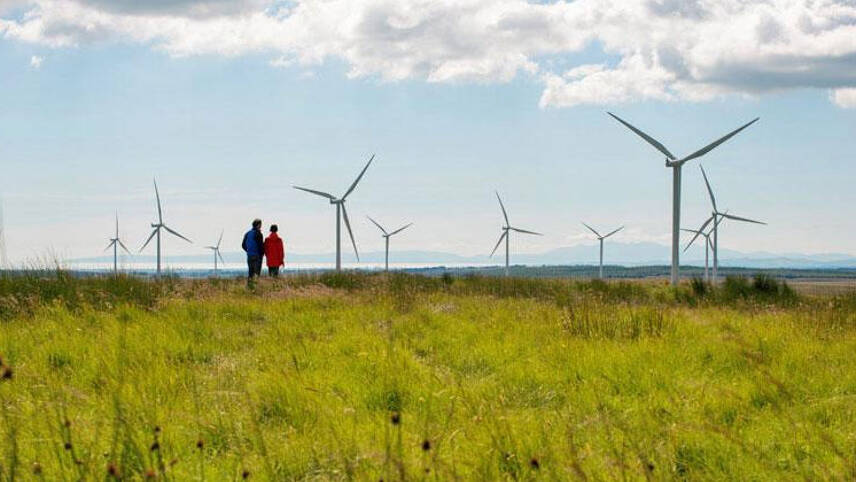This premium content is exclusive to edie Members.
To find out more about edie Membership, please click below.
If you are an existing member, login here

Image: ScottishPower Renewables
Prime Minister Rishi Sunak is forging ahead with tweaks to the UK’s green policy framework under the guise of delivering a “more pragmatic” transition to net-zero which avoids burdening working-class homes with high upfront costs for things like heat pumps or electric vehicles (EVs).
But a new CBI Economics report has revealed that, in doing so, Sunak risks hampering the growth of low-carbon industries that will prove key to creating more skilled and well-paid jobs in low-income regions.
Moreover, Sunak stands to lose votes from these regions at the next general election, which is a concern given how poorly the Conservative Party has fared in recent polls and given how decisive these constituencies could prove for the general election.
The CBI Economics report found that two-thirds of the top 25 regions for the growth of low-carbon industries are classed as key electoral battlegrounds, where Conservative MPs risk losing seats. These include Stockport, Derby and Stroud.
So, will working class voters prioritise the promise of well-paid green jobs in the long-term over the lure of immediate savings on heating and transport?
‘Net-Zero Hotspots’
The report was commissioned by think-tank the Energy and Climate Intelligence Unit (ECIU).
It describes regions where low-carbon industries have grown rapidly in recent years as ‘Net-Zero Hotspots’. Growth is measured by the percentage of the local economy accounted for by low-carbon sectors such as renewable energy, energy storage and EVs. Green finance and sustainable waste management firms are also included in these calculations.
Stockport and nearby Cheadle and Hazel Grove are named as England’s hottest Net-Zero Hotspots. During 2023, 15.9% of their local economies were accounted for by low-carbon businesses.
Businesses based here include solar and heat pump installers Renewable Planet, soalr equipment suppliers iGen Energy and Stockport Electrical Services, which specialises in EV charging point installations.
Scotland’s strongest Net-Zero Hotspots are Perth, North Perthshire and Gordon, largely for their expertise in offshore wind and alternative fuels. Mid and South Pembrokeshire ranked strongest in Wales.
In Wales, the West Midlands, Yorkshire and the Humber, low-carbon businesses were found to be twice as productive as the respective region’s average industry.
The report reveals a huge overlap between Net-Zero Hotspots and those regarded by the Government as the UK’s most deprived. For example, Hartlepool, Nottingham, Redcar and Cleveland are among the top 10% local authorities for income deprivation in England – and are all in the top 50 Net-Zero Hotspots list.
The report also found that jobs in low-carbon industries tend to be better paid, representing an opportunity for low-income families to upskill and improve their financial wellbeing. The average ‘net-zero’ job salary was found to be £44,600 in comparison to the national average salary in general – £35,400.
Policy wishlist
Across the 50 Net-Zero Hotspots assessed in the report, the size of the low-carbon economy grew by 9% in 2023. This is in comparison to 0.1% growth in the national economy as a whole.
Indeed, these sectors now account for almost 4% of Britain’s total national economy, representing £74bn of GVA last year.
The UK was the first country to enshrine a 2050 net-zero target in law and also boasts a plan for levelling up. But the report warns in no uncertain terms that future growth for these sectors, crucial to both agendas, is not guaranteed because policy interventions are needed to spur progress.
ECIU director Peter Chalkley said: “Against the backdrop of economic stagnation, the net zero economy is bucking the trend, but it’s clear that the policy U-turns of the past year have damaged investor confidence at a time when the US and EU are investing billions to compete for clean industries.”
Chancellor Jeremy Hunt has indicated that he will not try to outspend the EU or US in their provision of subsidies for low-carbon industries, totalling $369bn and €250bn respectively.
In a press call relating to the report, ECIU and CBI Economics representatives said that it is possible to remain competitive in the global cleantech growth race without matching spending, but that the Government had not provided a clear, long-term plan with alternative measures.
Indeed, recent flip-flopping from Sunak was suggested to have dented investor confidence and scared SMEs who now believe their Government support packages will shrink.
The CBI is advocating for Hunt to include a ‘Net-Zero Investment Plan’ in his Budget box next week. Such a plan would identify investment gaps and propose policy interventions to crowd in private finance.
“That’s one of many levers the Government can pull to support businesses in doubling down on green growth – but there are many more,” said CBI chief economist Louise Hellem.
On the press call, speakers called for the UK Government to provide a comprehensive update to its Industrial Strategy, which has not happened since 2017 – two years before net-zero was enshrined in law.
Energy UK’s deputy director for advocacy Adam Berman accused Ministers of delivering an “ad-hoc” industrial strategy consisting of one-off announcements rather than a clear policy package. He also acknowledged concerns that the situation may not drastically and quickly improve should Labour win the general election, given the Party’s recent scaling back of its landmark £28bn-a-year green industrial pledge.


Please login or Register to leave a comment.